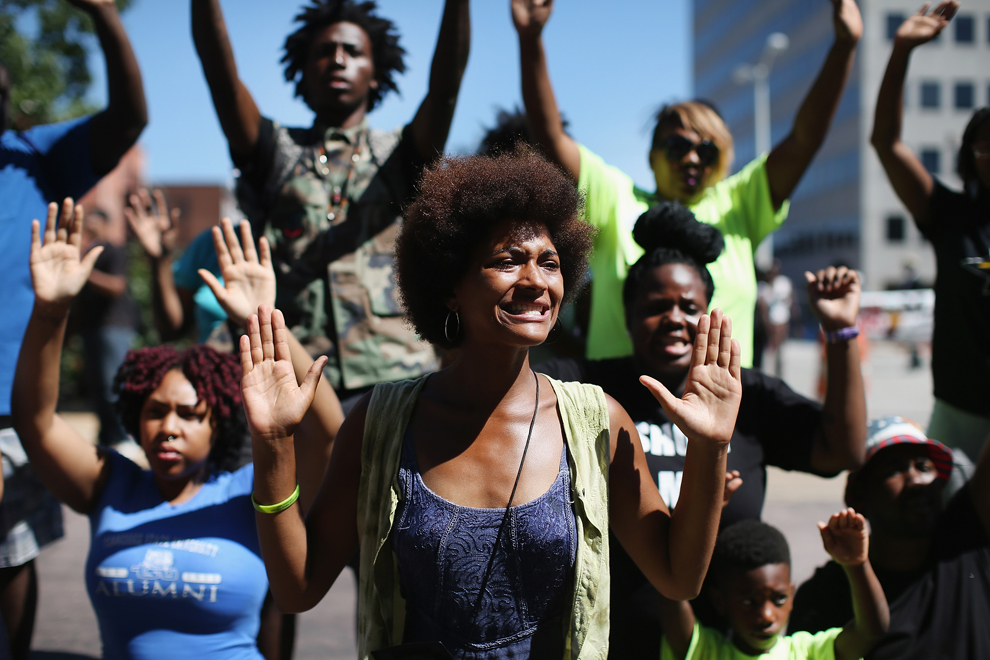Police officer Darren Wilson, whom a Ferguson Grand Jury refused to indict last week for shooting Michael Brown, is the latest in a long line of police and vigilantes who have gone free after killing unarmed black men. Upon hearing the decision, one National Public Radio columnist turned to an Audre Lorde poem for comfort.
Note that I’m not saying that Wilson is guilty. That should have been up to a jury to decide. But the public was denied a trial, even though, as the saying has it, in America you can indict a ham sandwich. Once again we saw America’s race-skewed criminal justice system at work.
The Washington Post’s Colbert King summarized this system as follows:
In places like Ferguson, police represent white authority. Authority empowered to enter the community backed by the extralegal support of white sentiment. Authority whose word is taken against the word of an accused African American. Authority that not only arrests, but punishes, too.
Where else can you fire 12 shots at an unarmed teenager, at least six of which strike his body, and walk away?
The New York Times’ Charles Blow, meanwhile, noted,
An October analysis by ProPublica of police shootings from 2010 to 2012 found that young black males are 21 times more likely to be shot dead by police officers than their white counterparts.
And here’s his colleague Nicholas Kristof, who quotes the same report:
If you’re white, your interactions with police are more likely to have been professional and respectful, leaving you trustful. If you’re black, your encounters with cops may leave you dubious and distrustful. That’s why a Huffington Post/YouGov poll found that 64 percent of African-Americans believe that Officer Wilson should be punished, while only 22 percent of whites think so.
After the verdict, NPR columnist Syreeta McFadden found herself repeating a stanza from Audre Lorde’s “A Litany for Survival,” just as she had when George Zinnemann was declared “not guilty” after shooting Trayvon Martin:
For those of us
who were imprinted with fear
like a faint line in the center of our foreheads
learning to be afraid with our mother’s milk
for by this weapon
this illusion of some safety to be found
the heavy-footed hoped to silence us
For all of us
this instant and this triumph
We were never meant to survive.
Here’s McFadden explaining her reaction:
Each time I re-read this stanza from “A Litany For Survival,” the chaos and confusion I feel is cleared away. The lines are clean and defiant. They name our aches, our hurts, the paradoxes of our living, and slay that demon that dogs our days, fear.
By the poem’s end, I’m washed clean. It’s a blessing and a baptism and a challenge to me to engage in a world that would seem to deny my life.
I needed it again, when news came of the shooting death of Michael Brown, and then again this week.
This poem is meant to break spells and fevers. That line, “we were never meant to survive” warns us of difficulties that will come. I think of this poem when I see photos of black millennials protesting police brutality. Fire and smoke envelop them as they face off with the police force of what was once just another city in the middle of America.
Some further explanation is perhaps warranted as to what McFadden finds so liberating about the poem. After all, why would a poem naming the fear that Blacks internalize with their mother’s milk–—and that heavy-footed whites have made sure that they internalized– give her hope? The final lines of the poem make it a little clearer so here is “A Litany for Survival” in its entirety:
A Litany for Survival
By Audre Lorde
For those of us who live at the shoreline
standing upon the constant edges of decision
crucial and alone
for those of us who cannot indulge
the passing dreams of choice
who love in doorways coming and going
in the hours between dawns
looking inward and outward
at once before and after
seeking a now that can breed
futures
like bread in our children’s mouths
so their dreams will not reflect
the death of ours:
For those of us
who were imprinted with fear
like a faint line in the center of our foreheads
learning to be afraid with our mother’s milk
for by this weapon
this illusion of some safety to be found
the heavy-footed hoped to silence us
For all of us
this instant and this triumph
We were never meant to survive.
And when the sun rises we are afraid
it might not remain
when the sun sets we are afraid
it might not rise in the morning
when our stomachs are full we are afraid
of indigestion
when our stomachs are empty we are afraid
we may never eat again
when we are loved we are afraid
love will vanish
when we are alone we are afraid
love will never return
and when we speak we are afraid
our words will not be heard
nor welcomed
but when we are silent
we are still afraid
So it is better to speak
remembering
we were never meant to survive
As I see it, Lorde concludes by saying that, if being silent is not going to chase the fear away, Blacks might as well speak up. After all, if they were never meant to survive anyway, then what is there to lose? The poem bolsters McFadden because it clears away the false assurances that lead to inaction. Protesting millennials refuse to be afraid but instead stand tall.
It is always better to speak.


